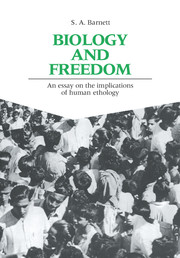Book contents
- Frontmatter
- Contents
- List of illustrations
- Preface
- Acknowledgements
- Part 1 An introduction
- Part 2 Homopugnax: the violent species
- Part 3 Homo egoisticus: the selfish species
- 6 Evolution and natural selection
- 7 Environment and heredity
- 8 Stories of human evolution
- 9 Darwinism, genetics and politics
- Part 4 Homo operans: the greedy species
- Part 5 Homo sapiens: the human species
- Glossary
- Notes
- References
- Name index
- Subject index
7 - Environment and heredity
Published online by Cambridge University Press: 04 August 2010
- Frontmatter
- Contents
- List of illustrations
- Preface
- Acknowledgements
- Part 1 An introduction
- Part 2 Homopugnax: the violent species
- Part 3 Homo egoisticus: the selfish species
- 6 Evolution and natural selection
- 7 Environment and heredity
- 8 Stories of human evolution
- 9 Darwinism, genetics and politics
- Part 4 Homo operans: the greedy species
- Part 5 Homo sapiens: the human species
- Glossary
- Notes
- References
- Name index
- Subject index
Summary
Can you, Socrates, tell me, is human excellence something teachable? Or, if not teachable, is it something to be acquired by training? Or, if it cannot be acquired by training or by learning, does it accrue to men at birth or in some other way?
Plato: MenoThe interaction of heredity and environment is crucial for our ideas about humanity and for social policy. It also presents severe difficulties, and not only for non-biologists. The reader should beware of anyone who says that argument on this topic is now settled, and can therefore be brushed aside. One difficulty arises from our language: it is legitimate to say that C.P.E. Bach inherited his harpsichord, his surname and his musical ability from his father, J.S. Bach. First, the (hypothetical) harpsichord was itself handed over; we have here the primary, legal meaning of inherited. Second, the statement about the name, in contrast, represents a social convention: a man may not be required by law or custom to use his father's name. (In some societies, Bach's sons would not be called Bach.) The third statement refers neither to bodily transfer nor to convention but (by implication) to the development of C.P.E. Bach from a fertilized egg: that is, to his ontogeny. This was inevitably influenced by genes derived from both his parents; but it also took place in a notably musical environment.
- Type
- Chapter
- Information
- Biology and FreedomAn Essay on the Implications of Human Ethology, pp. 102 - 115Publisher: Cambridge University PressPrint publication year: 1989



